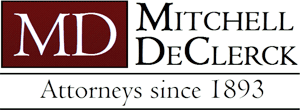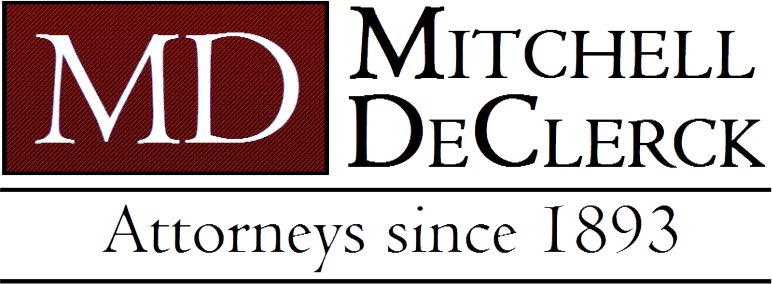How Does Bankruptcy Affect Property?
At Mitchell DeClerck, PLLC, our team of attorneys has attempted to answer the most common questions our clients have about Oklahoma bankruptcy. We hope this will be helpful.
This is not intended as legal advice. Bankruptcy is complicated and answers and counsel depend on the specific circumstances unique to each debtor. If you are considering bankruptcy, call us toll-free at 580-498-1787 for a free consultation so we can provide legal advice tailored to your specific unique situation. There is no obligation, and your call is confidential.
If I File Bankruptcy, What Property Can I Keep?
State law grants exemptions that allow an individual to exempt, or keep, certain kinds of property. Oklahoma law defines what assets are considered exempt but typically include (i) your home; (ii) the contents of your home; (iii) one vehicle per person; (iv) guns, personal effects and jewelry; (v) tools of the trade among other things but not in unlimited amounts. You must carefully consider what property is exempt – and what is not exempt – before you file. After you file, it is too late to legally plan or take action to protect nonexempt assets.
Do I Lose My Social Security Or Retirement Accounts If I File Bankruptcy?
Generally, no. Retirement accounts that are ERISA-qualified are not considered property of a bankruptcy estate, are not taken into consideration as non-assets or lost to the trustee. Social Security benefits are protected from assignment or garnishment for debts in bankruptcy. Once paid, the benefits continue to be protected only as long as they can be identified as Social Security benefits. For example, if all of the money in a bank account is deposited into the account, they are direct deposits. Social Security benefits are identifiable and generally protected. Conversely, if Social Security benefits are mixed or commingled with other funds, they may be lost. Here, the expertise of an experienced bankruptcy will be invaluable.
Do I Lose My Home If I File Bankruptcy?
This depends on many factors, i.e., are you in foreclosure; did you file a Chapter 7 or a Chapter 13 among others. Typically, if you are current on your mortgage and filed Chapter 7, you can keep your home if you continue to timely make mortgage payments. If you filed a Chapter 13 and can present a feasible Chapter 13 plan that the judge confirms, you can also keep your home.
Does A Bankruptcy Filing Have Any Impact On An Inheritance?
How an inheritance is treated in bankruptcy depends on when you become entitled to receive it and what Chapter you filed. In Chapter 7, if you become entitled to an inheritance within 180 days of your filing date, the inheritance will be a part of your bankruptcy estate and can be used to pay your debts. The important date is when your right to the inheritance is fixed, which is typically on the date of death of the person from whom you inherit. You might not receive property or money from someone’s estate for many months. In Chapter 13, your inheritance can be used in determining how much you have available to pay creditors under your repayment plan, and the 180-day limit does not apply. In either type of bankruptcy, you must inform the trustee about the inheritance. If you are considering filing for bankruptcy, you should ask a bankruptcy lawyer how an expected inheritance might factor into your plans.
What Is A Reaffirmation Agreement?
The process of renewing your obligation to pay a debt is called reaffirmation or reaffirming. Reaffirming a debt is voluntary and is not required by the law. You may voluntarily repay any debt instead of signing a reaffirmation agreement, but there may be other reasons that you will want to reaffirm a specific debt, such as a vehicle loan. For example, if you owe money on your primary automobile but are delinquent and want to keep the automobile, you may want to reaffirm the debt to make the lender happy and allow you to retain the automobile provided you pay the debt. See our page on debts for more information.
How Do Secured And Unsecured Debt Differ?
A secured debt is a claim that is secured by some type of property or collateral, either by an agreement or involuntarily with a court judgment or taxes. Creditors can generally eventually claim the property and foreclose or repossess it to pay the debt in the event of bankruptcy. If you have such a situation, you should consider a Chapter 13. Unsecured debt does not have collateral, and a creditor cannot claim it if you file for bankruptcy. For example, a mortgage is a secured debt on your property.
Which Type Of Bankruptcy Is Best For Me?
Consumers typically file Chapter 13 where repayment is made to creditors or Chapter 7 where the debts are to be discharged. Each chapter of bankruptcy determines:
- Which bills can be eliminated
- How long payments can be stretched out
- Which property you can keep among other things
The type or chapter you ought to file depends on your circumstances and if you have assets available to repay all or part of your debts. Bankruptcy laws are complex; consequently, determine if, when and which type of bankruptcy must be made with careful thought or advice from a good bankruptcy lawyer.
Get Clear Direction From The Established Bankruptcy Firm
We know that you have many questions about whether or not to file, what the steps are and what to expect if you do file. We can help. We offer a free consultation so that you can ask what you need to and get the answers that will help you decide how to proceed. Call 580-498-1787 or send us your contact information, and we will get in touch with you.
We are a debt relief agency. We help people file for bankruptcy relief under the Bankruptcy Code.

